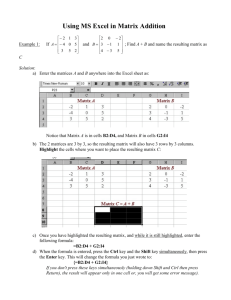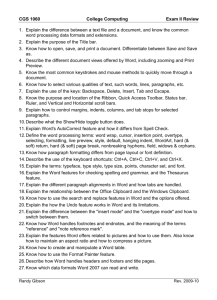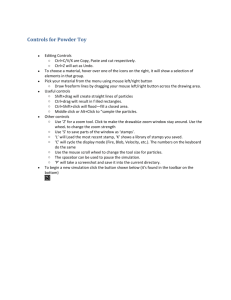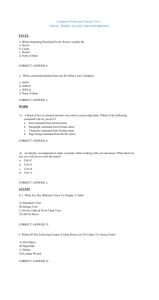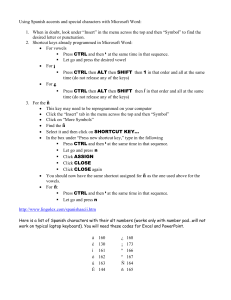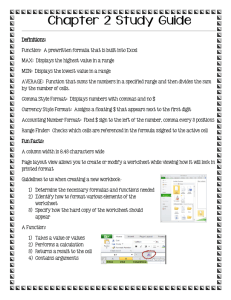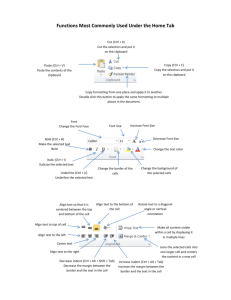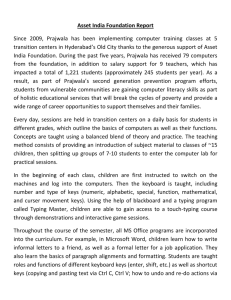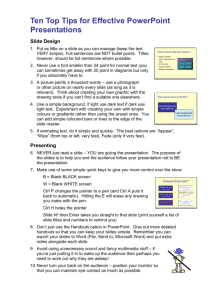Programming Languages of Computer
advertisement
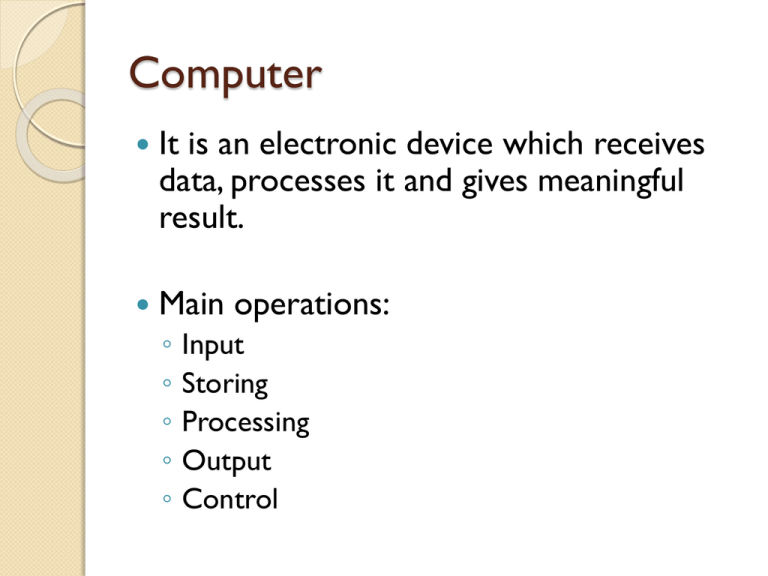
Computer It is an electronic device which receives data, processes it and gives meaningful result. Main operations: ◦ ◦ ◦ ◦ ◦ Input Storing Processing Output Control Architecture Of Computer CPU CPU: Performs all the processing tasks of a computer. Also called “Brain of the Computer”. Controls all parts of a computer system Has three components: Arithmetic and Logic Unit : has small locations called registers, and consists of Arithmetic and Logic sections. Control Unit : controls the operations of CPU, and governs transfer of data between IO devices and the system. Memory : RAM and ROM Types of Computer Based on Use: Analog Computer Digital Computer Hybrid Computer • Based on Sizes: Super Computer Main Frame Systems Mini Computer Personal Computers Micro Computers Generations of Computer First: 1949-54, Second: 1954-64Transistors, Magnetic Core, tape and Third: 1964-80, Integrated Circuits, High Speed Fourth: 1980-Now, Large Scale ICs, Semi-Conductor Vaccum Tubes/Electronic Valves, Magnetic Drum (about 1KB memory), Speed: 333ms disk (about 100KB main memory), Speed: 10ms Magnetic Cores (about 1MB main memory), Speed: 100ns Memory(about 10 MB main memory), Speed: 10ns Bits / Bytes / Words Unit Size Bit Nibble Byte Word One Binary Digit 4 bits 8 bits 16/32/64 bits Kilobyte (KB) Megabyte (MB) Gigabyte (GB) 1024 bytes 1024 KB 1024 MB Terabyte (TB) Petabyte (PB) 1024 GB 1024 TB Hardware Examples: Motherboard, VDU, Secondary and removable storage devices, Sound Card, Peripherals etc. Input Devices ◦ ◦ ◦ ◦ ◦ ◦ ◦ ◦ Keyboard Mouse Trackball Joystic Digital Camera Microphone Touch Screen Scanner Types of keys on a keyboard: ◦ Alphanumeric ◦ Special ◦ Function Output Devices ◦ ◦ ◦ ◦ ◦ ◦ Monitor (Video Display Terminal) Projector Printer Sound Card Speaker Video Card Software Application Software ◦ Software that a user uses to accomplish a particular task. ◦ Eg: MS Word, Notepad, Adobe Reader etc. System Software: ◦ Software that is designed to operate the computer hardware. ◦ Provides a platform for running application software. ◦ Eg: device drivers, operating systems, servers, utilities. Memory RAM: ◦ Dynamic RAM (DRAM) : needs periodic refreshing. ◦ Static RAM (SRAM): does not require periodic refreshing ROM: ◦ PROM ◦ EPROM ◦ EEPROM Programming Languages of Computer Machine Language Assembly Language High Level Language • eg: BASIC, C, C++, COBOL, FORTRAN, JAVA , C# Fourth Generation Language (4GL) Programming Languages of Computer Hardware Machine Language Assembly Language High level Language Programming Languages of Computer Program Compilation Converts program in high level language to executable machine language. Converts entire document at once. Program Interpretation Converts program in high level language to executable machine language. Converts document line by line. Operating Systems Set of programs that control, coordinate and supervises activities of a computer system. Types of OS: GUI Batch Processing Operating System Real-time Operating System Multi- User (eg: Time Sharing Systems) Multi-processing Multi-tasking Multi-threading Distributed Operating Systems Hardware OS Application User MSDOS (Disc Operating System) Developed by Microsoft (1981) for micro computers. Was most popular in 80s and mid 90s Single user OS. Character User Interface. Provides commands for File handling. It is not case sensitive. File names restricted to 8 chars. No spaces are allowed in filenames. It has various internal and external commands. File Naming in DOS Primary Name: Secondary Name or Extensions eg: .exe , .com, .bat, .ovr, .doc, .txt . Related Questions Microsoft Word is an example of a/an SBI PO 2010 (1) (2) (3) (4) OS Processing device Application Software Input device Ans: Application Sofware (1) (2) (3) (4) (5) C++ is a/an ………. language Unnecessary Object oriented Developed Machine Assembly Ans: Object Oriented SBI PO 2010 (1) (2) (3) (4) (5) ………. is a type of input machine. SBI PO 2010 Monitor Printer Plotter Keyboard None of these Ans: Keyboard (1) (2) (3) (4) (5) Which of the following is not an input unit? Touch pad Mouse Scanner Monitor Microphone Ans: Monitor SBI PO 2010 Program or instructions are included in …… of a system. PNB PO 2010 (1) (2) (3) (4) (5) Hardware icon information Software None of these Ans: Software The capacity of memory is measured in terms of PNB PO 2010 (1) (2) (3) (4) (5) bit byte nibble megabyte All of these Ans: megabyte The place where data and program goes is known as Allahabad Bank PO 2010 (1) (2) (3) (4) (5) mouse keyboard CPU CU None of these Ans: CPU In MICR, C stands for PNB PO 2010 (1) (2) (3) (4) (5) code color computer character None of these Ans: Character Which of the following is not one of the four major data processing functions of a computer? Allahabad Bank PO 2010 (1) (2) (3) (4) (5) Gathering data Processing data into information Analyzing the data or information Storing the data or information None of these Ans: Analyzing the data or information. These are specially designed computers that perform complex calculations extremely rapidly. Syndicate Bank PO 2007 (1) (2) (3) (4) (5) servers Super computers laptops mainframes None of these Ans: Super computers It is the science that attempts to produce machines that display the same type of intelligence that humans do? Bank of India PO 2010 (1) (2) (3) (4) (5) Nanoscience Nanotechnology Simulation AI None of these Ans: AI Word Processor (MSWord) Word Window and its components: Title bar Menu Bar Standard Tool Bar Ruler Scroll Bars (Vertical and Horizontal) Workspace Formatting tool bar Drawing tool bar Status bar. Look of MS Word 2003 Top half of Ms word: Bottom half of Ms word: Characteristics of Word Editing Feature. Permanent storage facility. Formatting (Changing the text in any form) Graphics Thesaurus (For changing word with its Synonyms) Find and Replace. Headers and Footers Page Orientation. Spell Checker. Mail Merge. Bullets and Numbering. Tables. Shortcut Keys Ctrl + A: Ctrl + B: Ctrl + I : Ctrl + U: Ctrl + C: Ctrl + X: Ctrl + V: Ctrl + P: Ctrl + F: Ctrl + Y: Ctrl + Z: Ctrl + K: Ctrl + L: Ctrl + R: Ctrl + E: Ctrl + J: Ctrl + M: Select all components of page. Bold highlighted section Italic highlighted section Underline highlighted section Copy selected text. Cut selected text. Paste. Open print window. Open Find box. Redo last operation. Undo last operation. Insert Link. Align left . Align right. Align Centre. Justify. Indent Paragraph. Ctrl + < (Ctrl + Shift + <) Ctrl + > (Ctrl + Shift + >) Ctrl + [ Ctrl + ] Ctrl + S Decrease font size. Increase font size. Decrease font size. Increase font size. Save the document. MS Excel It is a spreadsheet application. It has graphic tools, calculation support, pivot tables, and a macro-programming language called Visual Basic For Applications(VBA). Terms used in Excel Worksheet Row Number Column Letter Cell Cell Pointer Current Cell Range of Cells Work Book Data in Worksheet Formula Functions Cell Referencing : Absolute/Relative/Mixed Charts: Area/ Column/ Line/ Bar/ Pie Some Excel Shortcuts Ctrl + A Select all components of page. Ctrl + B Bold highlighted section. Ctrl + I Italic highlighted section. Ctrl + K Insert Link. F2 Edit the selected cell. F5 Go to a specific cell. F7 Spell check selected text or document. F11 Create chart. Ctrl + Shift + ; Enter current time. Ctrl + ; Enter current date. Shift + F3 Open excel formula window. Shift + F5 Open search box. Ctrl + F6 Switch between open workbooks/window. Ctrl + Page up Switch between excel worksheets in same document. Alt + = selected. create formula to sum all above cells into the cell currently Some Excel Shortcuts Ctrl + 5 Ctrl + Arrow Key Ctrl + Space Shift + Space Ctrl + F9 Ctrl + F10 Ctrl + ’ Ctrl + Tab Ctrl +Shift + $ Strikethrough highlighted selection. Move to next section of text. Select entire column. Select entire row. Minimize current window Maximize current window Insert value of above cell into current cell. Move between two or more open excel files. Format number in currency format. MS Powerpoint It is the presentation graphics part of MS Office suite. We can create various presentation materials like charts, graphics, slides, handouts, overheads etc. It can be used to create slide shows. Some methods for creating new presentation are: Auto Content Wizard, Design Templates, Sample Presentation and Blank Presentation. File formats of powerpoint are: the 2003 default .ppt(presentation), .pps (powerpoint show), .pot (template). Custom animations can be used to create small story boards by animating pictures to enter, exit or move. Powerpoint presentations can consist of several pages or slides. Common Operations Apply a Template to a Presentation A template is a PowerPoint presentation that defines how your text and slide background will look. A plain presentation is simply black text on a white background. Define Slide Transition and Animation Transition effects help define how a presentation move from one slide to the next. Animation defines how you want your listed information to come in and out of the presentation. Edit the Slide Master or Individual Slides The Slide Master in a template is a slide that controls the formatting, text, and objects that appear on every slide in your presentation. Some Powerpoint Shortcuts F5 Start the slide show from first slide. Shift + F5 F7 Shift + F7 Ctrl + F9 Start the slide show from current slide. Check the spelling of text. Thesaurus (suggest synonyms). Minimize current window MS Access It is an RDBMS that combines Microsoft Jet Database Engine with GUI and software development tools. The Microsoft Jet Database Engine ( JET stands for Joint Engine Technology), is a database engine on which several Microsoft products have been built. A database engine is the underlying component of a database. It stores data in its own format, and can link or import data from other Access databases. A database is a tool for collecting and organizing information. MS Access In a RDBMS data is stored in the form of tables or relations. RDBMS is a multi-table database, where tables are related to one other. Each table has number of rows and columns. Each column or field, represents a category Each entry in a table is known as a row or a record. MS Access is an RDBMS that enables us to manage relational database in windows environment. It enables us to enter, retrieve and modify/update data and also create forms and reports. Databases created in the Access 2007 format have the file extension .accdb, and databases created in earlier Access formats have the file extension .mdb Database Objects Tables: store data in form of rows and columns. Queries: For viewing data from a table. Forms: enable us to enter, view and modify in a table. Also known as “data entry screens”. Reports: generate reports based on tables and query results. Data Access Page: they are web pages to view and work with Macros: series of commands and functions that can be executed when a task is needed to be performed. Modules: Visual basic procedures and declarations stored as one unit. data from the Internet or an intranet, where data is stored in an Access database. (no longer supported in MS Access 2007). Some Access Shortcuts Ctrl + N Ctrl + O Alt + F4 Ctrl + P Open new DB. Open existing DB. Quit Access. Open print dialog box for printing current or selected object. P open print dialog box from print preview S open page setup dialog box from print preview C or Esc cancel print preview or layout preview. F12 or Alt + F12 open Save As dialog box. Ctrl + S or Shift + F12 or Alt + Shift + F2 : save a DB object. F4 or Alt + Down Arrow : open a combo box F9 : refresh the contents of a lookup field, list box or combo box. Page Up: move up one page. Page Down: move down one page. Up Arrow: move up one line. Tab: exit the combo box or list box. Ctrl + F: Ctrl + H: Shift + F4: open find tab in Find and Replace dialog box. open replace tab in Find and Replace dialog box. to find the next occurrence of the text specified in Find and Replace dialog box when the dialog box is closed. Related Questions (1) (2) (3) (4) In application software (MS Excel), there is ……. immediately below the title bar. SBI PO 2010 Text area Menu bar Standard tool bar Task bar Ans: Menu bar Just below the formatting bar, there is Task bar (2) Tool bar (3) Formula bar (4) Scroll bar (1) Ans: Formula bar SBI PO 2010 (1) (2) (3) (4) (5) “Comic Sans Ms” is example of SBI PO 2010 Font type Font face Font layout Font structure Font design Ans: Font face (1) (2) (3) (4) (5) By ……., text can be made more attractive in different colors, shapes and sizes. SBI PO 2010 Word Art Picture Word art text box Mail merge None of these Ans: Word Art Telephone no, date of birth, name of customer are the examples of PNB PO 2010 (1) (2) (3) (4) (5) record data file database None of these Ans: Data (1) (2) (3) (4) (5) In which grouping, the formatting of text is done in Word? PNB PO 2010 Tables, Paragraphs and Indexes. Paragraphs, Indexes and Sections. Characters, Sections and Paragraphs. Indexes, Characters and Tables. None of these Ans: Tables, Paragraphs and Indexes. (1) (2) (3) (4) (5) The item cut during cutting and pasting process is stored temporarily in PNB PO 2010 ROM Hard Drive Diskette Dashboard Clipboard Ans: Clipboard Data Communication and Network Signals: electric or electromagnetic encoding of data. Signaling: propagation of signal along suitable medium. Transmission: communication of data achieved by propagation and processing of signals. Parallel data transmission: each wire carries a bit of information. Series data transmission: bits are sent sequentially. (slower as compared to parallel transmission) Synchronous transmission: characters are transmitted as groups, with control characters in beginning and end of data stream. Asynchronous transmission: each char is transmitted separately. Modes of Communication: ◦ Simplex ◦ Half duplex ◦ Full duplex. Types of Computer Network: ◦ LAN (Local Area Network) eg: nw in a building ◦ MAN (Metropolitan Area Network) eg: nw connecting branches in different cities. ◦ WAN ( Wide Area Network) eg: internet. Topology: physical layout of a network. ◦ ◦ ◦ ◦ Mesh Star Bus Ring Mesh Topology Bus Topology Star Topology RingTopology Tree Topology: combination of Bus and Star topology. Internet It is a global interconnection of systems, linked together by various means. For communication to be possible an addressing mechanism and safe means of moving data is required The rules governing the sending and receiving data are implemented in TCP and IP protocols. TCP divides data stream into small packets. Internet Protocol puts addressing information on these packets. IP Address: is a 4 byte (32 bit) number that represents a logical address of a host. IP Versions ◦ IPv4 eg: 172.16.254.1 ◦ IPv6 eg: 2001:db8:0:1234:0:567:8:1 (128 bits or 16 bytes) Hosts: individual systems/machines at particular location. Domain is a general category that a computer on internet Domain names serve as humanly-memorable names for Domain Name Service(DNS): resolves queries for belongs to. Internet participants, like computers, networks, and services. domain names into IP Addresses for the purpose of locating computer services and devices worldwide. E- Mail: used for sending electronic messages. SMTP (Simple mail Transfer Protocol): is an Internet standard for e-mail transmission across Internet Protocol (IP) networks. Use net and news groups are set up by people for sharing common interests. Usenet is a worldwide distributed internet discussion system. Telnet: is a program runs on your computer and connects your PC to a server on the network. Telnet is a common way to remotely control web servers. Gopher protocol displays set of resources on Internet in the form of menus or list of items. World Wide Web (WWW): is a system of interlinked hypertext documents accessed via the internet. World Wide Web Consortium (W3C): is the main international standardization organization for development of standards for the world wide web. Hyper Text Markup Language(HTML): it is a tag based language that is used to create web pages. Standard Generalized Markup Language (SGML): is an ISO-standard technology for defining generalized markup languages for documents. HTML, XHTML and XML are all examples of SGML-based languages. Hyper Text Transfer Protocol (HTTP): used to manage transfer of HTML documents. Uniform Resource Locator (URL): is a way to avail resources on internet. Browser: is an application program which is used to explore internet resources. File Transfer Protocol (FTP): is a standard network protocol used to transfer files from one host to another host over a TCPbased network. Modem (Modulator-Demodulator): enables a computer to transmit data over telephone line. Wide Area Information Service (WAIS) : is a clientserver text searching system that is used to search index databases or libraries on remote computers. Mosaic is the web browser credited with popularizing the WWW. developed at the National Centre for Supercomputing Applications (NCSA). It gives access to internet resources by using GUI allowing users to navigate through documents. Information Technology IT refers to the branch of engineering that deals with manipulation, storage, retrieval and transmission(sharing) of information. It includes both hardware and software. IT now plays a major role in our day-today activities, and has automated various tasks which were earlier done manually. Computer Virus A computer virus is a malicious program that can copy itself and infect various systems. It spreads from one computer to another via network or internet, or through a removable media such as floppy disc, CD, DVD, USB drives etc. Some of the most popular viruses that came into light so far are: ◦ ◦ ◦ ◦ ◦ I Love You (2000) Code Red (2001) Nimada (2001) Melissa (1999) Sasser (2004) Malware, short for malicious software, is software to help hackers disrupt users computer operation, gather sensitive information, or gain unauthorized access to a computer system. Malware includes computer viruses, worms, trojan horses, spyware, adware, and other malicious programs. Antivirus Software can be used as preventive measure from viruses. They can destroy or remove viruses by finding them. Back up of data on other mediums can negate the losses incurred if data gets misplaced. Some Antivirus software are: ◦ ◦ ◦ ◦ ◦ ◦ Symantec Norton Antivirus Kaspersky Antivirus McAfee Antivirus Panda Security Trend Micro Bitdefender Related Questions (1) (2) (3) (4) (5) What is the full form of PPP? SBI PO 2010 Power to Process Point Point to Point Protocol Point to Power Protocol Protocol for Powerpoint None of these Ans: Point to Point Protocol In HTML, which tag is used to give background color? SBI PO 2010 (1) (2) (3) (4) (5) <Bg> <Bg colour> <Bg> <Bgc> <Background> Ans: <Bg colour> To hyperlink on web page through HTML which tag is used? SBI PO 2010 <a href> <a> <link> <hlink> <href> (1) (2) (3) (4) (5) Ans: <a href> …. Is a folder where virus suspected files are kept. SBI PO 2010 (1) (2) (3) (4) (5) Junk Mail Spam Mail Both 1 and 2 Delete Virus affected folder Ans: both 1 and 2 …. does work related to exchange of data between the computers . SBI PO 2010 Sound Card Network Card Expansion Slot Modem None of these. (1) (2) (3) (4) (5) Ans: Modem • Which tag is used to invoke form from HTML language? SBI PO 2010 (1) (2) (3) (4) (5) <Form> <Form method post> <Form invoke> <Form>< invoke> None of these Ans: <Form method post>
